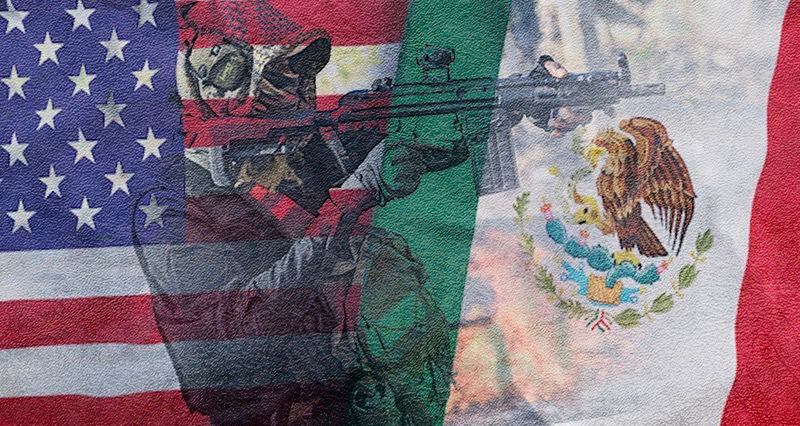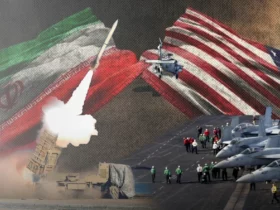By Daniel Rosas, Mexico City / Mexico
During his inauguration speech, US President Donald Trump made reference to “manifest destiny” – that ideology that makes people believe that by divine design, they can and should expand – and which, added to the Monroe Doctrine (America for Americans), has set off alarm bells worldwide.
In the particular case of Mexico, the overflight of US military intelligence drones in the area bordering Mexican airspace was interpreted by some analysts as an interventionist action. We must also add the designation of six Mexican cartels as “terrorist groups”, which would eventually allow the United States (in accordance with its laws) to carry out some military action.
Although it may no longer be necessary, since Mexico decided to send 29 drug traffickers to the United States, at the request of the United States, in response to Donald Trump who has said that Mexico does not do enough to stop drug trafficking into his country.
The Context of the Binational Relationship
Almost five months have passed since Claudia Sheinbaum became the Mexican president and a month has passed since Donald Trump became president of the United States.
Since then, Mexico began the “Northern Border” operation, which as of February 25 had achieved the arrest of 819 people, the seizure of 779 weapons, and 11,881 kilograms of drugs, including 54 kilograms of fentanyl. In other police operations, massive drug seizures and the arrest of cartel members have been achieved. In exchange, Mexico has achieved a “pause” in the imposition of tariffs on exports, announced by Donald Trump.
But the new US government seems to want more. It was recently confirmed that 6 Mexican cartels will be considered “terrorists.” Some analysts pointed out that this would allow the Trump administration to send military personnel or artillery vehicles to Mexico. Even the magnate and advisor to the US government, Elon Musk, after the designation, wrote in his “x” account: That means they’re eligible for drone strikes.
On social networks and Mexican media, the overflight of drones in the vicinity of Mexican airspace was reported. The Minister of Defense, Ricardo Trevilla, denied espionage work and assured that these overflights are at the request of the Mexican government. “It is part of coordination and cooperation without subordination,” said President Claudia Sheinbaum.
Regarding the possibility of a US military intervention against the Mexican cartels, so far it has not happened. On the contrary, in various events, including Flag Day (last February 24), President Sheinbaum reiterated her message: non-intervention and respect for Mexican sovereignty.
El Mayo Zambada
Ismael “el Mayo” Zambada is considered one of the main Mexican drug traffickers, perhaps only below Joaquín “el Chapo” Guzmán with whom he founded the Sinaloa cartel. That’s why to capture him, the United States government had to convince one of “El Chapo’s” sons to betray him. Joaquín Guzmán López delivered him through deception.
The Mexican government – whose president was then Andrés Manuel López Obrador – was not informed of that operation. On several occasions Mexico has requested explanations from the United States and on four occasions the Mexican government has requested his extradition; there has been no response, according to the Mexican Prosecutor’s Office.
For his part, Ismael Zambada sent a letter to the Mexican Foreign Ministry, in which he requests to be extradited to Mexico to avoid a possible death penalty in the United States; He claims that “he was kidnapped.” The Mexican government also considers that it was a kidnapping and announced that it will provide consular assistance.
But President Sheinbaum made it clear that it is not about defending the drug trafficker, but rather enforcing the international consular protection treaties to which anyone is entitled, including “el Mayo” Zambada.
The Transfer of other Capos
A couple of days after that statement, on Thursday, February 27, a meeting was held between security authorities from both countries in Washington. That same day, 29 people accused of drug trafficking were transferred from Mexico to the United States, which generated diverse opinions and a change in the bilateral relationship.
Some analysts and media described this delivery as a “gift” to the United States; others assured that it was a strategy in the negotiation: a message to the United States.
The truth is that the moment in which this transfer occurred draws attention. Added to this are the request for the extradition of Ismael “el Mayo” Zambada, the binational security meeting, as well as the upcoming completion of the pause in the extension for the imposition of tariffs on Mexico and other countries scheduled for March 4.
Among the 29 people taken on military planes to the United States are Rafael Caro Quintero, accused of having ordered the torture and murder of a DEA agent in 1985 and who has been requested by the United States for 40 years.
But the leaders of the “Los Zetas” cartel, the “Jalisco Nueva Generación” cartel, the “Northeast Cartel”, the “Gulf Cartel” and the “La Nueva Familia Michoacana” cartel, among some other criminal groups, were also handed over. Some of the bosses had been facing trials for 8 and 11 years and may have received favors in Mexico from corrupt judges, according to the government.
It was an “act of justice and authority that is precedent,” said Security Minister Omar García Harfuch.
The Change in the Binational Relationship
Mexican authorities justified the transfer of the 29 drug traffickers to the United States, arguing that it is binational cooperation, and at the request of Washington.
In a press conference, Mexican Attorney General, Alejandro Gertz, acknowledged that it was not an extradition, but rather a direct request from the United States; that is, the corresponding legal process was not carried out. This represents a change in the relationship between both countries in terms of security, by expediting the delivery of criminals requested by the United States. There could even be more transfers, the Prosecutor acknowledged.
The meeting in Washington between security authorities from both countries was rated positively on both sides of the border. Mexico trusts that this greater cooperation will reduce tension with the United States and the imposition of tariffs can be stopped. The United States celebrated the surrender of the drug traffickers, particularly Rafael Caro Quintero who “for 40 years had been one of the most wanted criminals.”
The first hearings began in the United States in which the bosses have pleaded “not guilty.” Not surprising. The United States will seek the death penalty for some of them; In Mexico there is no death penalty, so some people expressed their rejection of the decision to hand them over. The authorities announced consular assistance for them as well.
The question that remains in the air for now is: how much will this situation benefit the relationship between Mexico and the United States?

















Leave a Reply